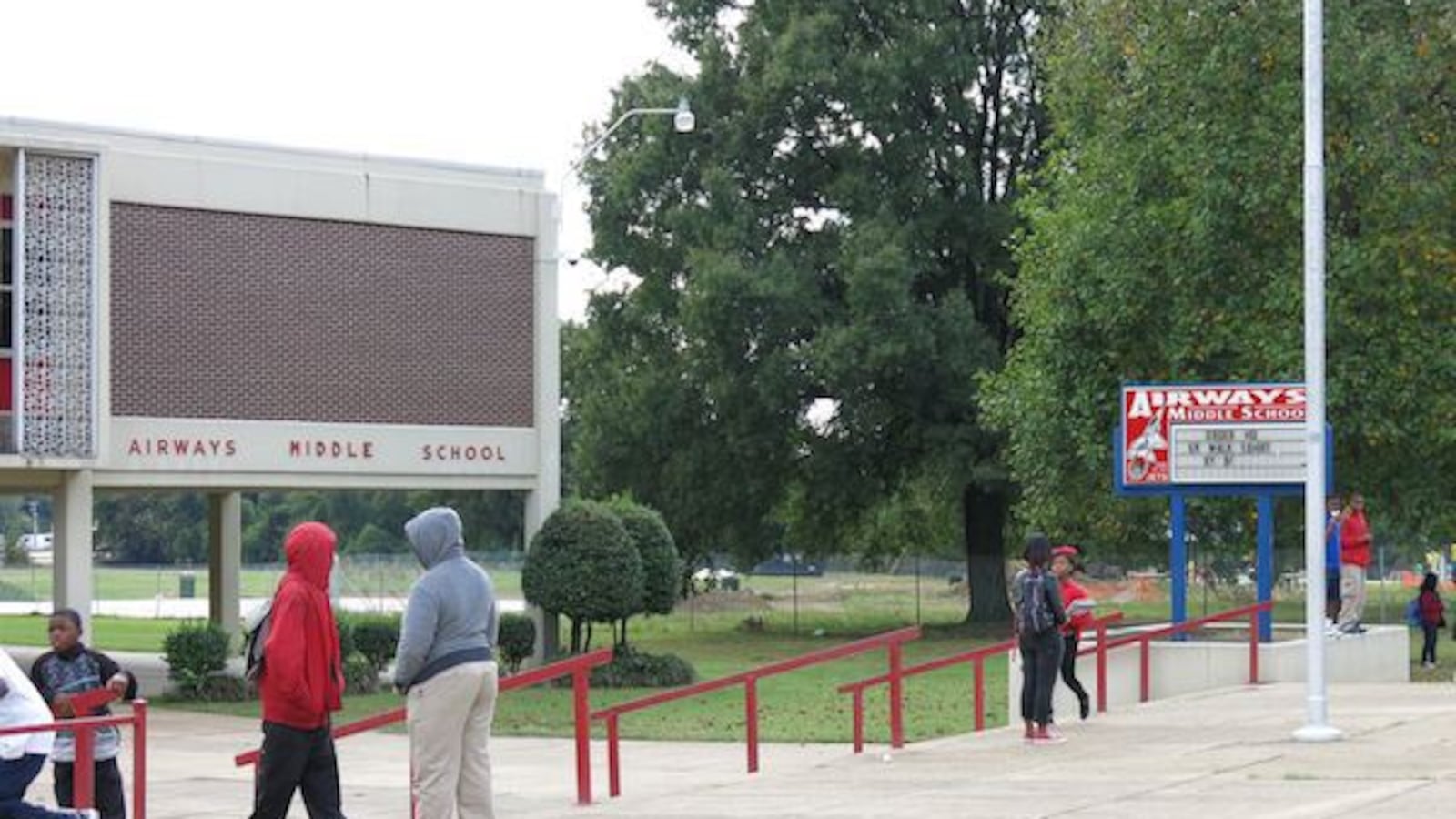When Chris Barbic became the founding superintendent of Tennessee’s Achievement School District in 2012, he was taking on a challenge that had foiled many others.
That challenge: to take large numbers of low-performing schools and catapult them into the top tier. Barbic vowed to move schools from the bottom 5 percent of test scores in the state into the top 25 percent in just five years — without displacing their populations of very high-need students.
States and districts have long stumbled to reach far more modest improvement goals. Many have turned to closing schools — in many cases destabilizing student populations — as a last resort.
In a letter sent to supporters early Friday morning announcing his planned departure from the district later this year, Barbic said he had learned that the work of overhauling neighborhood schools had proved more difficult than he had envisioned. But he also said he is confident that Tennessee is on the right track.
And he outlined seven lessons that he is taking away from his work in the state, which has so far focused on schools in Memphis. Those lessons are instructive for the growing number of initiatives to replicate the ASD’s work in other states.
Those efforts represent one answer to a persistent question in American education policy: How do you fix struggling schools when deep poverty means that students face major challenges outside of the classroom? Some, including teachers unions, have argued that achievement gaps cannot be closed without first addressing poverty. Others — including the charter school movement where Barbic cut his teeth — have argued that schools should be held accountable for their students’ performance no matter what kind of homes and neighborhoods those students go home to every day.
Taken together, Barbic’s lessons amount to a vote of confidence in the latter “no excuses” approach — with major caveats about the impact of poverty and about the charter sector’s capacity to deliver on its bold promises.
Here’s the short form of Barbic’s takeaways, pulled straight from his letter.
- We do far better when we trust our teachers and school leaders.
- Autonomy cannot outpace talent.
- The current debate is off the mark, part 1 … The “poverty trumps education” argument sells our educators, and more importantly, our kids way too short.
- The current debate is off the mark, part 2. Let’s just be real: achieving results in neighborhood schools is harder than in a choice environment.
- It’s time for more high-performing charters to step up.
- Parents are not a part of this conversation, and they must be.
- This work can break your heart, literally and figuratively.
And here’s the full letter that Barbic sent to supporters at 5:33 a.m. Friday.
Friends and colleagues:
I am writing to share an important and tough decision. I have decided that I will be leaving the Achievement School District at the end of the calendar year. I am fully committed to ensuring a smooth transition in leadership, and I know that this is the right time for this change.
Let me share with you a couple of reasons behind this difficult decision. The first is that we have now built a strong foundation, and as we shift the ASD from a start-up to sustainable organization, it is a natural time for a leadership transition. I came here to answer Tennessee’s urgent call to improve Priority schools and to build a new kind of school district that would put the power back in the hands of parents and teachers. Now that this foundation is in place, it is the right time to think about passing the baton to a new leader who will take our work to the next level for the benefit of the students and families we serve.
A second reason is a bit difficult to admit, but in the spirit of openness, I am simply at a point in my life where I need to focus more on my family and my health. Building the ASD has been grueling work. The pace and stress of a superintendent role, especially this one with weekly trips from Nashville to Memphis and multiple nights away on the road, does not lend itself to decades of work. We have been at this for nearly four years, and I have promised my family a change in pace.
I leave with great pride in our educators’ hard work and accomplishments. In just a few short years, teachers and school leaders—given the power and freedom to make their own decisions—have written a new narrative about improving education in Priority schools. We have built the ASD for lasting success, with 14 public school operators serving over 10,000 kids in nearly 30 schools this upcoming school year. And we have catalyzed district-level action and improvement in Priority schools, compelling districts to make courageous decisions and launch major interventions.
The impact has been clear. Kids’ lives are being changed. Over the last two years, student proficiency in Tennessee’s Priority schools grew four times faster than in non-Priority schools, and thanks to hardworking partners and educators, there are 4,500 fewer students attending Priority schools in Memphis. By this time next year, every Priority school in Tennessee will be in the ASD, in a district-led iZone, or undergoing some kind of major local intervention. If we keep this up, within just a few years, chronic failure in schools will have real potential to be a thing of the past.
To be sure, there is much more to be done. Our state and our schools are nowhere near where they need to be. But it’s undeniable that the state of education in Tennessee Priority schools is fundamentally different now than in 2012. There comes a moment when organizations reach clear transition points. I believe now is one of those moments. And I feel good about the rationale and timing of this decision.
I also wanted to share a few lessons learned. Here is what I know upon leaving the Achievement School District:
We do far better when we trust our teachers and school leaders. In the ASD, we trust educators by giving them the power to make the decisions that matter most in schools—staffing, program, budget, and time. They are the ones—not I or any “central” administrator—making things happen in schools, and with the right structure in place, this cycle of fast learning and educator-led decision-making will continue. By removing the bureaucracy—and putting the power in the hands of nonprofit school operators—we can eliminate the vicious cycle of the hard-charging superintendent needing to “reform” a central office once every three years.
Autonomy cannot outpace talent. All of our schools in the ASD are given autonomy. The difference between the high performers and the struggling performers lies in the quality of the people leading and teaching. The only magic bullet in this work? Committed and talented people. So the big question for all of us is how we get and keep enough committed and talented people in our schools.
The current debate is off the mark, part 1. This experience has given us the opportunity to directly run a network of schools in Frayser, a challenged but very determined neighborhood in Memphis. We see the impact of poverty on kids and families there every single day, and there’s no question this makes living and learning more difficult. But we have also seen schools like Whitney Elementary—with a leader like Debra Broughton and a team of teachers whom together have created an incredible culture—where our students are starting to make impressive gains. The fact that we see this happening in Frayser and other parts of Memphis, including in Shelby County’s impressive iZone schools, proves that schools in similar neighborhoods can achieve the same results. And it proves that all kids, in the right conditions supported by the the right team of adults, can achieve at high levels no matter their circumstances.
The “poverty trumps education” argument sells our educators, and more importantly, our kids way too short. And it is perhaps one of the most dangerous propositions that exists in our country today.
The current debate is off the mark, part 2. Let’s just be real: achieving results in neighborhood schools is harder than in a choice environment. I have seen this firsthand at YES Prep and now as the superintendent of the ASD. As a charter school founder, I did my fair share of chest pounding over great results. I’ve learned that getting these same results in a zoned neighborhood school environment is much harder.
It’s time for more high-performing charters to step up. These are agile, fast-learning organizations that get better faster than big bureaucracies. I applaud the charter operators who have stepped up to do the important and difficult work of neighborhood school turnaround. We need more organizations to follow their lead.
Parents are not a part of this conversation, and they must be. I’ve spent plenty of time in “community” meetings where the voices of parents are shouted down by people who are not from the community, do not have kids attending a chronically under-performing school, and are simply hell-bent on defending the status quo. This is pure manipulation by those who are not in our parents’ shoes. We need to advocate for parents and make sure their voices—whether supportive or resistant—are heard at all times.
And the last major lesson I’ve learned—this work can break your heart, literally and figuratively. Almost exactly a year ago, I suffered a heart attack. There is no surprise that this was the result of work-related stress. This work is incredibly hard. It is hard mentally, physically, and emotionally. The stakes are high. And we have a lot to prove—or disprove—in this country about what it means to educate ALL kids. I am committed to continuing this work and being part of an honest conversation about this, but now I think it is the right time to pass the baton to a new leader of the ASD.
I am incredibly grateful to be joined in this work by a governor who supported me every step of the way, by Kevin Huffman who was kind enough to bring me here, by our commissioner, Candice McQueen, who has been gracious in her support, and by the local and national philanthropic community whose commitment to this work and to our kids is inspiring. I am lucky to work alongside the best team I have ever had the pleasure of working with, and with teachers and leaders across our schools who put the real heart into this work.
And finally, a special note of gratitude to my friends and family in Frayser who gave us a chance and who have stuck with us through the ups and downs of this work. I hope we have made you proud of what we have built so far and that you are as hopeful as I am about the future of our kids.
It is all of these relationships and great people in this work that make this decision so difficult. I will be leaving confident that Tennessee’s schools are better off today than when we began, but convinced that the work ahead requires fresh leadership committed to our shared goal: the very best education possible for every child in this great state.

Chris Barbic, Superintendent
Achievement School District

